Who should be PC gaming's mascot?
Back in 2014 we wrote an article about an imaginary E3 PC gaming press conference, an event that would put the PC on stage with the same kind of spotlight that Nintendo, Sony, and Microsoft's consoles got year after year. PC gaming was in strong shape by 2014, and it's in far stronger shape now (it even has its own E3 press conference, the PC Gaming Show!), but the PC has always lacked a singular figurehead or a mascot to call its own. It's great that no single company steers PC gaming. It's open to everyone. But it would be nice to have a mascot.
Mascots are just fun. They lend personality to faceless corporations, and in the best cases, they end up serving as a north star to guide them. Nintendo wouldn't have its particular approach to joyful, family friendly games without Mario defining its image. Sure, Nintendo makes billions of dollars off Mario merchandise, too, but his global popularity makes him a welcoming gateway to Nintendo's legacy. PC gaming doesn't have a character like that.
And hey, we tried. For years PC Gamer put Coconut Monkey in the magazine and on demo discs. More recently, he tried his hand at podcasting. Yet stardom eluded him. Coconut Monkey is not the hero PC gaming needs.
But who is? Who (or what) could possibly represent all of PC gaming and serve as the most recognizable figure for our platform? It's a hard question—partially because PC gaming is now so big, it has swallowed up some of gaming's biggest mascots already. Master Chief may be the face of Xbox, but the Halo games are all on PC now. Sony may be positioning Astro Bot as its modern mascot, but PlayStation games are starting to make their way to PC, too. The lines are blurred. Sega's boy Sonic has been a free agent for years at this point. PC gaming won the console war, but whose face goes on the flag?
It's tempting to look for a mascot with a long history. Lara Croft is a gaming icon, but '90s Lara and modern Lara feel like different characters, and the new games just don't measure up to mascot stature. Doomguy has made a real comeback with id's last two games, but as a character he's overshadowed by the game that surrounds him. He's more of a vessel, a pair of arms built to hold a shotgun.
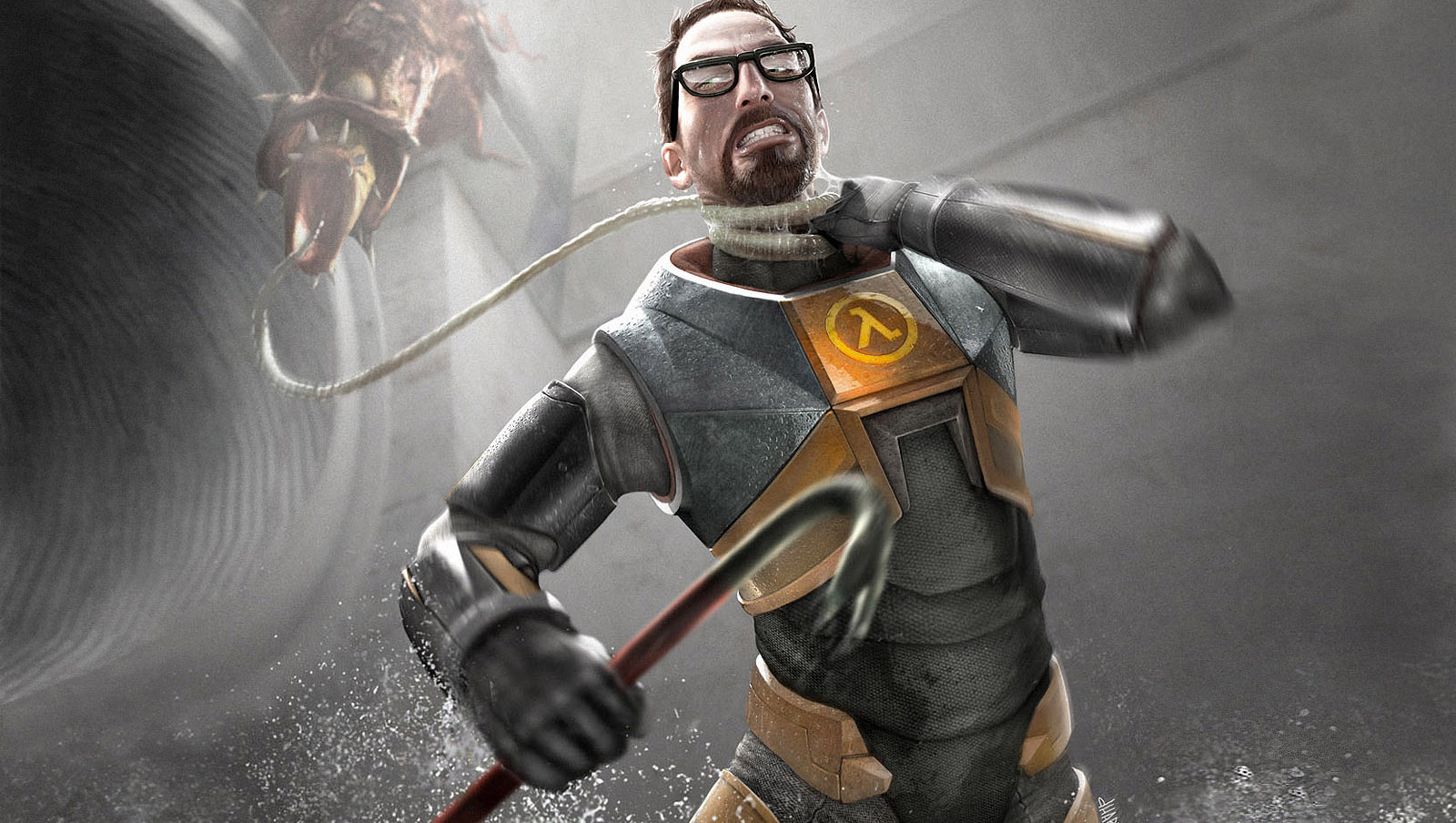
For years we looked at Gordon Freeman and the stars of Valve's Team Fortress 2 as the PC's star players. Gordon makes a great mascot: the goatee and glasses are recognizable even in the abstract, and the Half-Life games were popular and significant enough to make a huge impact. A gaming mascot can't just be a recognizable character for people who already follow games—they need to break into the mainstream.
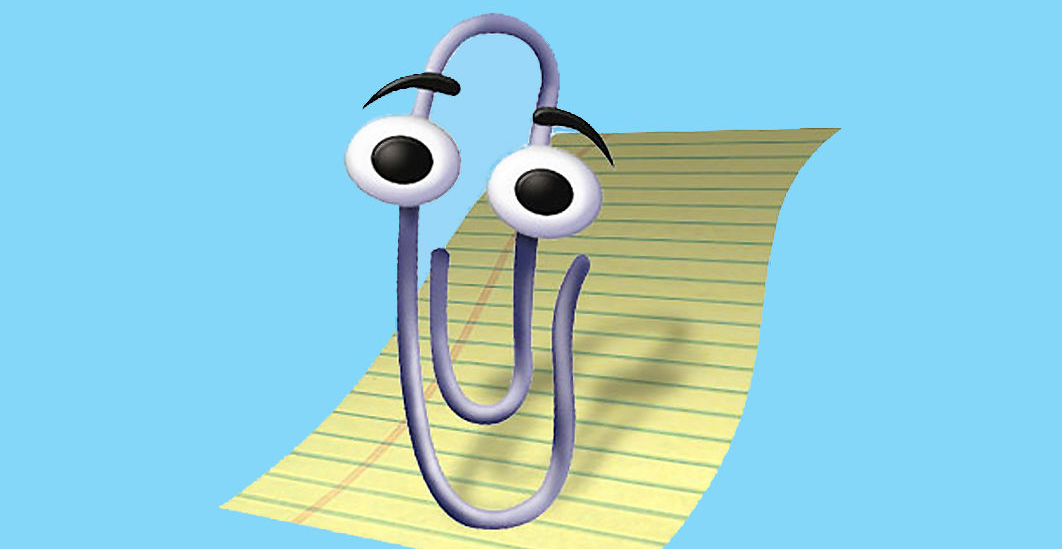
Then 15 years passed without a new Half-Life. Team Fortress 2 kept ticking along with updates, but it now exists as a relic of what first-person shooters looked like in 2010. The characters are still brimming with personality, but they're more like a nostalgic in-joke for PC gamers than a public face.
If you're a terrible person, you might suggest: Hey, what about Clippy? And maybe there is an argument for Clippy. Mascots need to have an outsized influence—Mickey Mouse, for example, long ago outgrew Walt Disney's early animated shorts. Clippy was only in a few versions of Microsoft Office in the late '90s and early 2000s, offering absolutely useless advice on how to insert bullet points into a document or whatever. He's still parodied today, decades after being relevant. Impressive reach—but Clippy was bad and will always be bad and should stay buried in an unmarked grave somewhere on the outskirts of Redmond, Washington.
There's only one character who feels big enough to represent PC gaming today, and that's Geralt of Rivia.
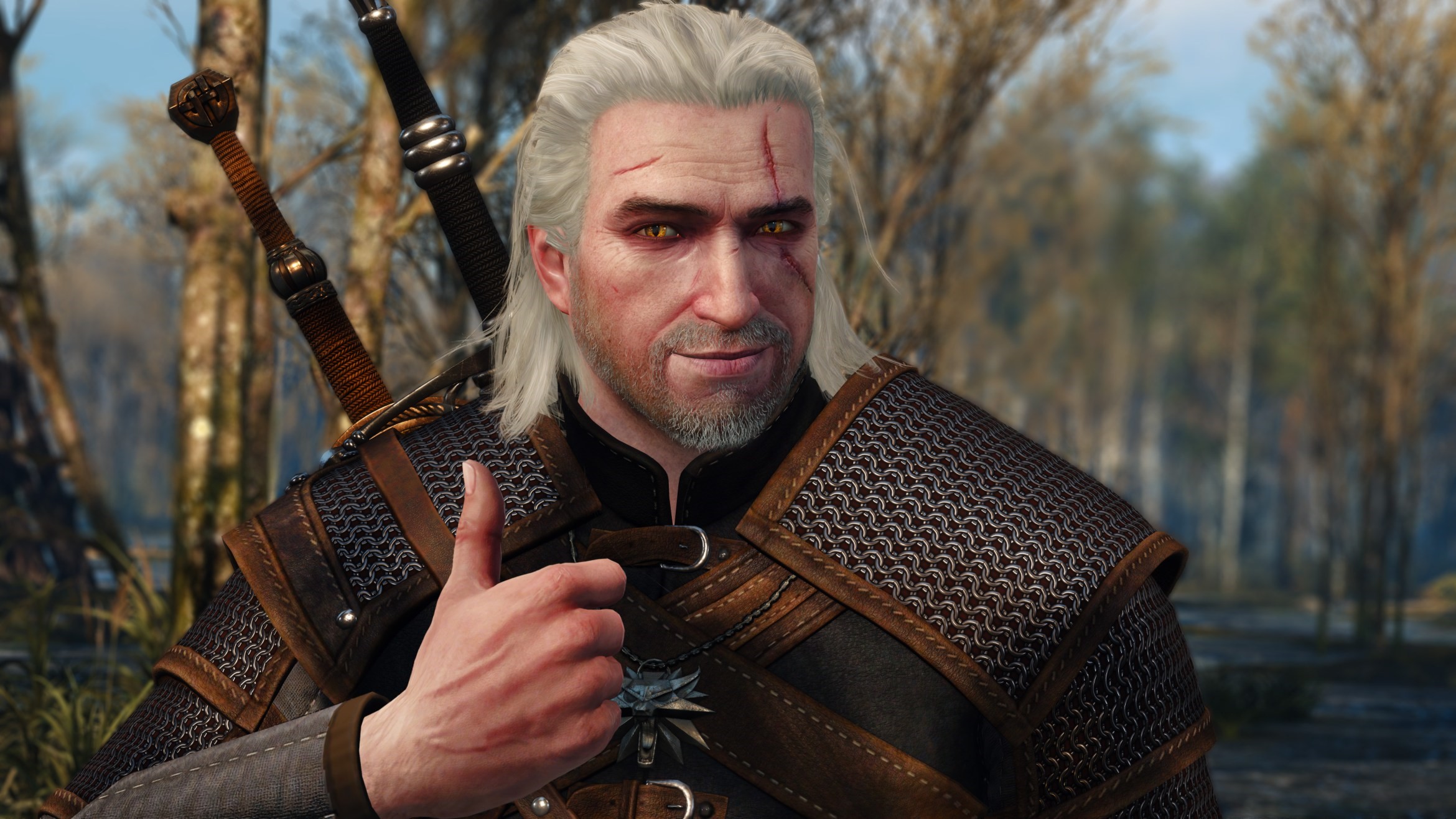
Geralt has been a PC character for more than a decade, and his first adventure, released in 2007, was a PC exclusive. It's a classic PC gaming story: an ambitious but janky RPG from a small inexperienced developer, released at a time when the PC was really struggling for attention. I'm not exaggerating when I say the PC was fundamental to The Witcher's success. It used an already-old Bioware engine built for Neverwinter Nights as a foundation, and CD Projekt released many, many patches for the game, improving it greatly over a year or two. At the time, it cost tens of thousands of dollars to release a patch on the Xbox 360. In an alternate universe, The Witcher would be remembered (barely) as a buggy Xbox game that never improved.
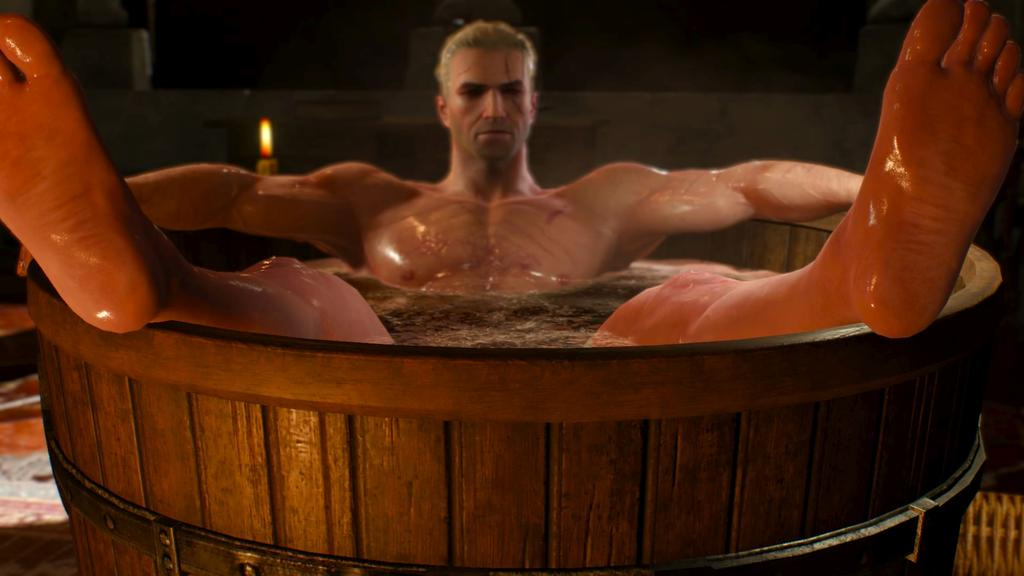
The Witcher 3, of course, is what made Geralt huge (and also big). Even though it's been almost five years since The Witcher 3 came out, Geralt feels as relevant a PC character now as he did then. The Witcher 3 was still one of the best-selling Steam games of 2020. Geralt's shown up in a card game spin-off and starred in his own Netflix series, which itself kicked off a huge wave of interest in Andrzej Sapkowski's Witcher novels. Geralt also encourages good hygiene, and it's important for any mascot to be a positive role model.
Henry Cavill has ensured that Geralt is well-known outside the world of gaming, and he's even helped cement Geralt's status by being a big PC gamer himself. The Witcher 3 was such a landmark game even CD Projekt Red bought into the hype, apparently believing that Cyberpunk 2077's troubled development would end up working out fine. Because after all, they'd made The Witcher 3.
Geralt is not exclusively a PC character, but I don't think that matters. So what if The Witcher 3 was also on the PlayStation 4 and Xbox One—ultimately, CD Projekt's roots as a PC developer and years of mods keep Geralt in the conversation on PC in a way he isn't on consoles. And what range! Fighting, talking, smirking, bathing, romancing. Geralt can do it all, even in chibi form.
Even if CD Projekt doesn't release another Witcher game for many years, Geralt feels like the face of modern PC gaming for a long time to come. He's our mascot—at least until the WASDemon starts getting the respect he deserves.
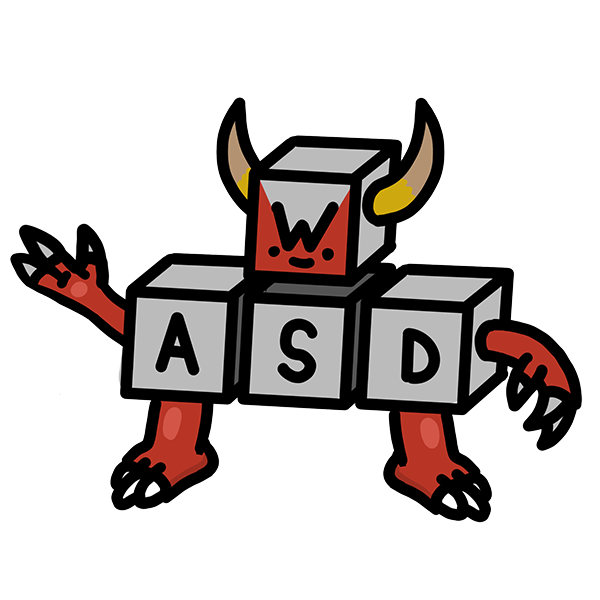
from PCGamer latest https://ift.tt/3iRmmlr
Back in 2014 we wrote an article about an imaginary E3 PC gaming press conference, an event that would put the PC on stage with the same kind of spotlight that Nintendo, Sony, and Microsoft's consoles got year after year. PC gaming was in strong shape by 2014, and it's in far stronger shape now (it even has its own E3 press conference, the PC Gaming Show!), but the PC has always lacked a singular figurehead or a mascot to call its own. It's great that no single company steers PC gaming. It's open to everyone. But it would be nice to have a mascot.
Mascots are just fun. They lend personality to faceless corporations, and in the best cases, they end up serving as a north star to guide them. Nintendo wouldn't have its particular approach to joyful, family friendly games without Mario defining its image. Sure, Nintendo makes billions of dollars off Mario merchandise, too, but his global popularity makes him a welcoming gateway to Nintendo's legacy. PC gaming doesn't have a character like that.
And hey, we tried. For years PC Gamer put Coconut Monkey in the magazine and on demo discs. More recently, he tried his hand at podcasting. Yet stardom eluded him. Coconut Monkey is not the hero PC gaming needs.
But who is? Who (or what) could possibly represent all of PC gaming and serve as the most recognizable figure for our platform? It's a hard question—partially because PC gaming is now so big, it has swallowed up some of gaming's biggest mascots already. Master Chief may be the face of Xbox, but the Halo games are all on PC now. Sony may be positioning Astro Bot as its modern mascot, but PlayStation games are starting to make their way to PC, too. The lines are blurred. Sega's boy Sonic has been a free agent for years at this point. PC gaming won the console war, but whose face goes on the flag?
It's tempting to look for a mascot with a long history. Lara Croft is a gaming icon, but '90s Lara and modern Lara feel like different characters, and the new games just don't measure up to mascot stature. Doomguy has made a real comeback with id's last two games, but as a character he's overshadowed by the game that surrounds him. He's more of a vessel, a pair of arms built to hold a shotgun.

For years we looked at Gordon Freeman and the stars of Valve's Team Fortress 2 as the PC's star players. Gordon makes a great mascot: the goatee and glasses are recognizable even in the abstract, and the Half-Life games were popular and significant enough to make a huge impact. A gaming mascot can't just be a recognizable character for people who already follow games—they need to break into the mainstream.

Then 15 years passed without a new Half-Life. Team Fortress 2 kept ticking along with updates, but it now exists as a relic of what first-person shooters looked like in 2010. The characters are still brimming with personality, but they're more like a nostalgic in-joke for PC gamers than a public face.
If you're a terrible person, you might suggest: Hey, what about Clippy? And maybe there is an argument for Clippy. Mascots need to have an outsized influence—Mickey Mouse, for example, long ago outgrew Walt Disney's early animated shorts. Clippy was only in a few versions of Microsoft Office in the late '90s and early 2000s, offering absolutely useless advice on how to insert bullet points into a document or whatever. He's still parodied today, decades after being relevant. Impressive reach—but Clippy was bad and will always be bad and should stay buried in an unmarked grave somewhere on the outskirts of Redmond, Washington.
There's only one character who feels big enough to represent PC gaming today, and that's Geralt of Rivia.

Geralt has been a PC character for more than a decade, and his first adventure, released in 2007, was a PC exclusive. It's a classic PC gaming story: an ambitious but janky RPG from a small inexperienced developer, released at a time when the PC was really struggling for attention. I'm not exaggerating when I say the PC was fundamental to The Witcher's success. It used an already-old Bioware engine built for Neverwinter Nights as a foundation, and CD Projekt released many, many patches for the game, improving it greatly over a year or two. At the time, it cost tens of thousands of dollars to release a patch on the Xbox 360. In an alternate universe, The Witcher would be remembered (barely) as a buggy Xbox game that never improved.

The Witcher 3, of course, is what made Geralt huge (and also big). Even though it's been almost five years since The Witcher 3 came out, Geralt feels as relevant a PC character now as he did then. The Witcher 3 was still one of the best-selling Steam games of 2020. Geralt's shown up in a card game spin-off and starred in his own Netflix series, which itself kicked off a huge wave of interest in Andrzej Sapkowski's Witcher novels. Geralt also encourages good hygiene, and it's important for any mascot to be a positive role model.
Henry Cavill has ensured that Geralt is well-known outside the world of gaming, and he's even helped cement Geralt's status by being a big PC gamer himself. The Witcher 3 was such a landmark game even CD Projekt Red bought into the hype, apparently believing that Cyberpunk 2077's troubled development would end up working out fine. Because after all, they'd made The Witcher 3.
Geralt is not exclusively a PC character, but I don't think that matters. So what if The Witcher 3 was also on the PlayStation 4 and Xbox One—ultimately, CD Projekt's roots as a PC developer and years of mods keep Geralt in the conversation on PC in a way he isn't on consoles. And what range! Fighting, talking, smirking, bathing, romancing. Geralt can do it all, even in chibi form.
Even if CD Projekt doesn't release another Witcher game for many years, Geralt feels like the face of modern PC gaming for a long time to come. He's our mascot—at least until the WASDemon starts getting the respect he deserves.

via IFTTT

Post a Comment